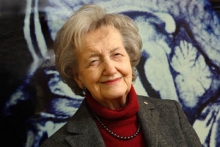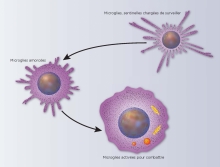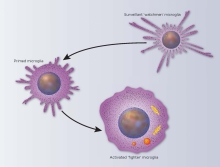November 27, 2012 - Clinician-scientists take a unique, integrated approach that is essential to advancing science and medicine. Problems encountered in the clinic inspire research and new findings from the labs are directly applied to patients’ needs. The integrated model is a hallmark of the Montreal Neurological Institute and Hospital – The Neuro, at McGill University and the MUHC and is now being replicated worldwide. Two clinician-scientists at The Neuro have been awarded grants today to further research on Parkinson’s disease and HIV/AIDS.


November 21 2012 - Dr. Brenda Milner, pioneer in the field of cognitive neuroscience whose discoveries revolutionized the understanding of memory, is being inducted into the Canadian Science and Engineering Hall of Fame today. The induction ceremony takes place at the Canada Science and Technology Museum in Ottawa. Other inductees are physicist and educator Dr. Ursula Franklin and aviation pioneer J.A.D. McCurdy.

November 8 2012 - After a worldwide search, the renowned Montreal Neurological Institute and Hospital – The Neuro – of McGill University and the McGill University Health Centre has a new director, Guy Rouleau, MD, PhD, FRCPC, OQ. Dr. Rouleau, a prominent Quebec clinician-scientist recognized for his contributions to science and society, will also hold the Wilder Penfield Chair in Neuroscience as Professor of Neurology and Neurosurgery at McGill. The appointment takes effect January 1, 2013.

Un événement commun se produit dans maintes pathologies du système nerveux : des cellules microgliales, qui sont des sentinelles chargées de surveiller, se muent en combattantes. Cellules immunitaires du système nerveux, les microglies ingèrent et détruisent des agents pathogènes et des cellules nerveuses lésées. Bien que ce processus soit crucial dans l’organisme, on savait jusqu’à présent très peu au sujet des mécanismes moléculaires d’activation des microglies.

In many pathologies of the nervous system, there is a common event - cells called microglia are activated from surveillant watchmen into fighters. Microglia are the immune cells of the nervous system, ingesting and destroying pathogens and damaged nerve cells. Until now little was known about the molecular mechanisms of microglia activation despite this being a critical process in the body.
International study with researchers at The Neuro reveals links with other neurodegenerative diseases
MONTREAL, October 9, 2012 - Scientists at the Montreal Neurological Institute and Hospital – The Neuro, McGill University working with a team at Oxford University have uncovered the genetic defect underlying a group of rare genetic disorders.

Genes predict the brain’s reaction to smoking

Have you ever wondered why some people find it so much easier to stop smoking than others? New research shows that vulnerability to smoking addiction is shaped by our genes. A study from the Montreal Neurological Institute and Hospital - The Neuro, McGill University shows that people with genetically fast nicotine metabolism have a significantly greater brain response to smoking cues than those with slow nicotine metabolism. Previous research shows that greater reactivity to smoking cues predicts decreased success at smoking cessation and that environmental cues promote increased nicotine intake in animals and humans. This new finding that nicotine metabolism rates affect the brain’s response to smoking may lead the way for tailoring smoking cessation programs based on individual genetics.<!--break-->







